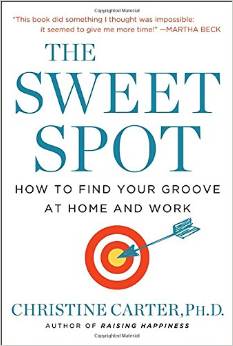Podcast: Play in new window | Download
When my awesome 84-year old mom routinely answers my question, “How are you, Mom?” by saying, “I’m just so busy.” And when my friend’s YPO (Young Presidents Organization) group is holding a retreat on dealing with “the rat race,” I think, “Whoa! We’re all stretching, stressing, striving, spinning the hamster wheel. And ready to . . . .snap?
 My goals will stretch me again this year: teach three classes better each semester, serve a few great clients, and write a groundbreaking book. Oh, and be a supportive dad and husband. So, yup, when you ask me how I am, my first instinct will be to say, “I’m so busy.” (Is it a badge of honor in our time? Proof of worth?)
My goals will stretch me again this year: teach three classes better each semester, serve a few great clients, and write a groundbreaking book. Oh, and be a supportive dad and husband. So, yup, when you ask me how I am, my first instinct will be to say, “I’m so busy.” (Is it a badge of honor in our time? Proof of worth?)
But when you ask me, I instead, intend to say, “I’m working in my sweet spot.”
When you’re in your sweet spot, you are working smarter not harder. Reading The Sweet Spot, a book being officially released tomorrow, my colleague and friend Christine Carter has helped me to be work and live so much SMARTER. Reading this book is kind of like having coffee with her, but she backs up common sense suggestions — lots of them — with fascinating research on how the brain works. The springboard idea for the book, which brain researchers are proving over and over, is that our conscious, rational minds are amazing, but they are seldom a match when pitted against the older, automatic, and habitual parts of our brain. In The Sweet Spot, you learn to use this knowledge of how the hidden parts of your brain work, and to put them to your use, giving you more ease, focus, and alignment toward what matters most.
Too abstract? Here are two scientific principles and a simple shift I made. Principle one — proven in lots of lab work — is that making decisions tires out the brain. Second, is that constant task-switching also burns energy. Dr. Carter’s practical advice: Don’t do what Dan Mulhern used to do and read your email before your feet have hit the ground in the morning. Doing so distracts the mind into multiple channels of activity, prompting decisions (even stupid little ones) to be made, and burning energy left and right. Carter offers some don’t’s like this. But more helpful, she offers some do’s.
My new “do” has been to use the positive power of habit to guide my morning routine. I get up. I make a pit stop. I go directly to the stretches that keep my cantankerous (and potentially big energy draining) back nimble. Then I go straight to meditation which gives me calm and focus. Every day. No decision. Simple habit. A good habit has replaced one that had introduced stress into my day before I’d even dipped my spoon into my Raisin Bran.
I have long known that meditation lifts the heavy blanket (which a Carter chapter calls) “the overwhelm.” It does so in two ways. Morning meditation generates a platform of calm. Years ago, I had a strange realization: if you asked me at the end of the day – when I pulled into my garage– whether I had meditated that morning, I could tell you. Just by the feel. By my breathing. By whether I was ready to let go of work and be present at home. Instead of a blanket of worry and overwhelm, I had a floor of equanimity or evenness. The second way meditation helps is it teaches you to be present. In simple breathing — practiced every day — you gain the capacity, even in the middle of madness, to let go of past thoughts and future pre-occupation and be here now. And thus be smarter with that meeting, or child, or challenge, instead of trying harder to impossibly fix everything at once. (Carter, by the way, cites studies that meditators who when sick, recover in an average of 5 days, compared to 8 days for those who don’t. That’s a smart way to save some time!)
Golfers know the sweet spot, so do tennis players, so do singers. I’d encourage you to pick up this book, take your time reading its practical ideas, and
Lead from your sweet spot.

Thanks, Dan. One of your best filled with both the philosophical and the practical.
I hope it doesn’t say something about the busy-ness of your readers that, apparently after three days, mine is the first comment. Perhaps another indicator that many of us need to hear this.